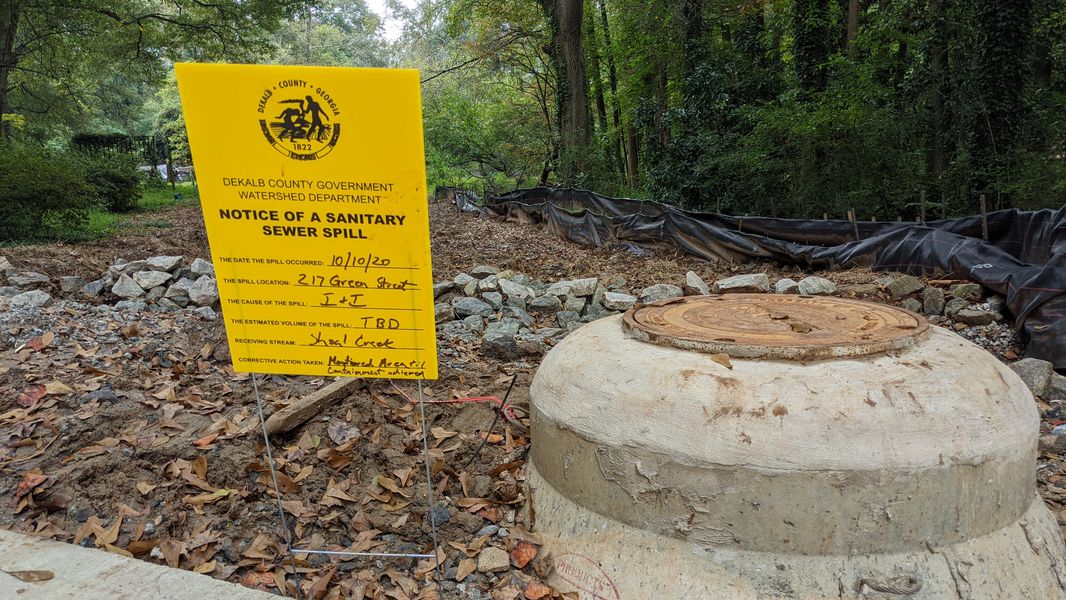
A sign noting a recent sewer spill near Green Street in the Oakhurst neighborhood. SPECIAL PHOTO
By Tyler Estep
For decades, DeKalb County’s aging sewer system has spilled wastewater into streams, rivers and communities, creating public health and ecological dangers while fueling outrage among residents. The system’s struggles have slowed development as well, limiting the capacity available for new projects and creating extra hurdles for would-be builders.
But officials say a new arrangement with environmental regulators will, finally, get things fixed — while also helping speed development in areas that have borne both the brunt of the county’s sewer spills and the roadblocks they create for progress.
“It’s huge, especially in the Snapfinger basin,” DeKalb CEO Michael Thurmond said. “It’s very difficult to support any new development in that area, just because of repeat [sanitary sewer overflows] and lack of capacity.”
The sewer basin Thurmond referenced covers much of south and west DeKalb — areas that with a population that is predominantly Black, generally has a lower median income than the rest of the county and is often underserved. Some of the oldest sewer infrastructure in DeKalb, including pipes dating back to the 1930s, rests there too.
And it shows.
Of the approximately 24 million gallons of sewage that spilled in the county through September of this year, nearly 22 million was in the Snapfinger basin. The area has nearly half of the 103 repeat spill sites identified in the new version of the consent decree that DeKalb first entered into with state and federal regulators in 2010.
That modified version of the consent decree gives DeKalb 7 1/2 more years to complete fixes that were stalled by the dysfunction and corruption of former county leaders. It also includes a new “capacity assurance program” that would allow the county to bank “credits” for repairs and other spill-limiting projects.
The county can then take incremental advantage of the new capacity that’s available, allowing some developments to move forward rather than waiting until entire projects are completed.
That could potentially make a big difference in the Snapfinger basin in particular. More than 54% of the 330 sewer capacity requests currently pending in DeKalb County are for projects in the area.
“I believe it’s possible to do the [sewer] improvements while developing the area in and of itself. I don’t think we want to miss an opportunity,” said Edwinett Murphy, who has lived in the Churchill Downs subdivision in south DeKalb for more than two decades.
Others see it quite differently.
Jacqueline Echols is the board president at the South River Watershed Alliance, a local environmental group that has for years fought for stricter oversight and quicker repairs to the county’s sewer system. She called the modified consent decree “absolutely asinine” and said the capacity assurance program includes too many caveats and not enough scrutiny from the U.S. Environmental Protection Agency, Georgia’s Environmental Protection Division or anyone else outside the DeKalb County government.
“There is really no way to negotiate any kind of reasonable outcome for DeKalb County and the South River and folks’ backyards with what we have in front of us now,” Echols said.
The proposed modifications to the consent decree were approved by DeKalb County commissioners on Oct. 20 and were posted to the federal register a week later. A formal public comment period is currently scheduled to remain open through Friday.
After that, regulators will evaluate any comments received — and potentially make corresponding changes — before seeking final approval from U.S. District Court Judge Steven D. Grimberg.
Longtime DeKalb Commissioner Larry Johnson, whose district covers the southwest corner of the county and much of the Snapfinger basin, was among the chief advocates for the capacity assurance program. He said it will help put south DeKalb on a level playing field with more affluent parts of the county, many of which are in other sewer basins and don’t have the same hurdles for economic development.
“I would come back a year after it’s approved,” Johnson said, “and you’ll start of seeing a lot of things moving through the pipeline that are going to help south DeKalb get to a whole other level.”
DEKALB’S MODIFIED CONSENT DECREE
A proposed modification to DeKalb County’s sewer repair consent decree with state and federal regulators is currently open for public comment. The timeline on the original consent decree, which was first entered in 2010, expired earlier this year with the county far behind schedule on the necessary repairs.
The proposed modifications include:
- A 7 1/2-year extension to complete hundreds of millions of dollars of repairs to priority areas in DeKalb’s sewer system. The work includes replacing 59 miles of trunk sewer lines, the largest pipes in the system.
- A list of 103 repeat spill sites throughout the county that must be addressed in the next four years; have of them must be fixed in the first two years.
- A civil penalty of $1,047,000
- A “capacity assurance program” that allows DeKalb to bank credits for completed repairs and use a portion of those credits to permit developments.
Read the original story on AJC.com.











